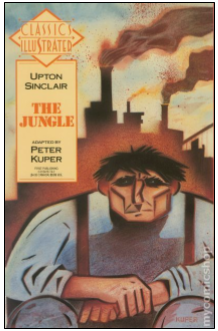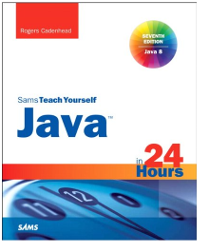Who Would Steal a Honda Odyssey?

I got up this morning to take my son to school and our minivan was missing from the driveway. It had been stolen. I kept pushing the key fob buttons expecting it to magically reappear.
Somewhere in Florida today there is a thief who appreciates the flexible cargo space and peppy car-like handling of the 2012 Honda Odyssey.
Ghost of Computer Author Past
You could tell a lot about an author or conference speaker by tracking the changes made to that person's short bio over the years. Here's how I described myself in 1996 for Java Unleashed, Second Edition, a frankenbook written by 24 authors in the book publishing rush after Java was launched:
Rogers Cadenhead is a web developer, computer programmer and writer who created the multi-user games Czarlords and Super Video Poker. Thousands of readers see his work in the Fort Worth Star-Telegram question-and-answer column "Ask Ed Brice." Rogers has developed Java applets for Tele-Communications Inc. and other clients, and is the coauthor of Teach Yourself SunSoft's Java Workshop in 21 Days. Rogers wrote Chapters 1, 5, 17 and 18 and contributed to Chapter 2.
It didn't take long for me to drop references to Czarlords and Super Video Poker, two online games I created for bulletin board systems. My friend Mark Terrano and I started a company to create multi-user BBS games right before the Web came along and killed the businesses of every potential customer. Our total earnings were $180.
Terrano did a little bit better on his next game venture. He was lead designer of Age of Empires II and is a founder of Hidden Path Entertainment.
Interview with Zoe Zolbrod
A version of this post originally appeared in the May 2013 mailing of the Capa-Alpha APA.
During the early '90s when I took a stab at becoming a comic book writer, I requested submission guidelines from several dozen publishers. One of the people I heard from was First Comics submissions editor Zoe Zolbrod. Her letter of Feb. 5, 1991, shared a new plan the company was undertaking. "First is going to begin to publish black-and-white, limited-series, creator-owned comic books," she wrote. "These would be sent to us by the creator all ready to be shot and printed (scripted, penciled, inked and possibly lettered). ... There would be no page rate for these books; instead the artist(s) would get a predetermined percentage of the profits."
The letter and First's submission guidelines are linked.
After being one of the most successful comics companies to spring up in the '80s, First was fading fast by the time of my letter. After it shut down in 1992, Zolbrod stayed in publishing and has become a book editor, essayist and novelist.
In the late '90s she published the zine Maxine, billed as a "literate companion for churlish girls and rakish women."
Her 2010 debut novel Currency is about a female American backpacker in Thailand who has a romance with a local street hustler that brings her into the world of exotic animal smuggling.
On an impulse, I looked up Zolbrod on the web and she agreed to answer some questions in email about her days at the company.
![]()
Question: It looks like you got the First Comics job right after graduating from Oberlin, based on your LinkedIn profile. How long did you work at First and what was it like to comb through the submission pile? Do you recall any of the writers and artists you discovered whose books went on to be published?
Zolbrod: I got the job as editorial assistant for First Publishing in 1990, a few months after graduating from Oberlin, thanks to a tip passed through the Oberlin grapevine that started with Anina Bennett, who was an editor there. One of the things I did as part of my interview process was to review a couple of unsolicited submissions, because dealing with the slush pile was a big part of the job. I was far from a comics geek. I liked a few alternative things like Hate and Love & Rockets, but I had virtually no familiarity with the world of super heroes, which was a lot of what First published and received as submissions. I remember deciding to just give my honest opinion of the comics I was given to review, including my feminist analysis, because I didn't even know enough to fake something else. I guess the other candidate they were considering had more comics knowledge, but First was mostly looking for someone who could write and think critically, and so they took me on.
I looked at probably hundreds of submissions and dutifully wrote a personal note back to most everyone, which encouraged a couple people to respond a little too enthusiastically. I only found a few things that I thought were worth passing up the chain based on the criteria I was given, and of those, only one did everyone get excited about. I can't remember the name or the artist now, but there was some discussion with the guy about signing him. Little did I know, though, that I had arrived at the beginning of the end of First.
Within a year of having taken the job, the company decided to move from a monthly publishing schedule to a quarterly one, and the ceased signing anyone new. Soon after that, they suspended publication entirely -- actually, Lone Wolf & Cub might have limped on for awhile -- and laid a bunch of people off.
I kept my job -- probably because I was working for peanuts -- but things eventually ground down to a stop. I was there for less than two years, but that job really changed my life. I had gotten a little editorial experience, and I also got a bonus for sticking around until the bitter end. The bonus provided me with a nut of money that allowed me to backpack around Southeast Asia for the better part of the year.
Q: The letter I received was from February 1991 in response to a request for submission guidelines. You described how First was planning to start publishing black-and-white, creator-owned comic books that were submitted in completed form to the company. First would only do the cover and possibly redo the lettering. Was this a last-ditch effort to keep the company in business, and do you recall if anything came of it before it closed?
Zolbrod: Oh, I forgot about that. Now that you mention it, I think that was the criteria I was given for what to pass up the chain. The one submission everyone liked was to be part of it. But no, nothing ever came of it. Things started going downhill fast very soon after I sent that letter.
Q: It looks like the final things First published were Eric Shanower's Blue Witch of Oz, the final issues of Dreadstar, Grimjack, Lone Wolf & Cub, and a Classics Illustrated adaptation of Upton Sinclair's The Jungle by Peter Kuper (I need to find a copy of that). What do you think caused the demise of the company, one of the most successful comic book publishers of the '80s?
 Zolbrod: I believe I recall the Peter Kuper art coming in. I had been aware of him before I started the job and was really impressed. It made working there seem glamorous. There was often quite a buzz when the Classics Illustrated art came in, and we would all gather round, but I didn't work with any of those artists. They had their own team, and I was an underling.
Zolbrod: I believe I recall the Peter Kuper art coming in. I had been aware of him before I started the job and was really impressed. It made working there seem glamorous. There was often quite a buzz when the Classics Illustrated art came in, and we would all gather round, but I didn't work with any of those artists. They had their own team, and I was an underling.
Although I hadn't heard of Grimjack before I started, that was the First series that I genuinely got into. I was sad when it went to a quarterly and then ceased. I wasn't in the know enough to have a really clear picture of what happened, but I recall hearing that the licensing of Teenage Mutant Ninja Turtles had been a huge cash cow for First, and that had ceased by the time I got there in '90. I think the licensing with Classics Illustrated and Lone Wolf might have been expensive, and their own series weren't doing as well as they had been.
Q: You published the novel Currency inspired by your experiences traveling Southeast Asia alone, and now you're working on a memoir about suffering sexual abuse as a child. How did you decide to write about a subject so difficult, and how is it going?
Zolbrod: I'm looking at the memoir as being more about how I interpreted what happened to me as a child at different stages of my life, and less about the actual abuse. It's a situation with a lot of gray area, or at least a lot of psychological gray area to me. I guess I came to writing about it in the hopes of gaining a better understanding, which has eluded me all these years.
Also, I became aware that this issue affects a lot of people in nuanced ways that aren't well represented, and I want to add to the dialogue. I have a strong vision for the book and it's going well, if not quickly.
![]()
To find out more about Zoe Zolbrod's books and read her blog The Next Youth Hostel, visit her website ZoeZolbrod.com. She also is a frequent essayist for the literary site The Nervous Breakdown.
Teach Yourself Java 8 in 24 Hours
 I'm working on author review today for the Java 8 edition of my book Sams Teach Yourself Java in 24 Hours. This is the phase of the project near the finish line where I get all the chapters back as edited Word documents, review the changes recommended by editors and answer any questions they have. I also give each chapter a quick read and make sure the code compiles. (I hate it when a computer book has code that doesn't compile.)
I'm working on author review today for the Java 8 edition of my book Sams Teach Yourself Java in 24 Hours. This is the phase of the project near the finish line where I get all the chapters back as edited Word documents, review the changes recommended by editors and answer any questions they have. I also give each chapter a quick read and make sure the code compiles. (I hate it when a computer book has code that doesn't compile.)
One of the things I like about writing a 24 Hours book is that my publisher, Pearson Education, gives me license to have some fun with the material. Computer books can be as dry as Ben Stein teaching high school economics if you don't liven them up.
I ended chapter 2 with this passage:
During this hour, you got your first chance to create a Java program. You learned that to develop a Java program you need to complete these four basic steps:
1. Write the program with a text editor or a tool such as NetBeans.
2. Compile the program into a class file.
3. Tell the Java Virtual Machine to run the class.
4. Call your mother.
Along the way, you were introduced to some basic computer programming concepts such as compilers, interpreters, blocks, statements, and variables. These will become clearer to you in successive hours. As long as you got the Saluton program to work during this hour, you're ready to proceed.
(The fourth step has nothing to do with Java programming. It's just something my mother suggested I put in the book.)
The book comes out May 23. Supplies are limited to however many we print.
Converting a WordPress Blog to HTML Files

I've been doing more programming lately, primarily in Java because I am writing several books that teach the language. I have a few big announcements coming soon about those projects.
My current coding effort is an application that turns a no-longer-updated WordPress blog into a set of static HTML pages. The goal is to make it easier to retire a blog while keeping the content available in the form that's most likely to be future proof and extremely simple to move around.
WordPress can export a blog's pages, entries and comments to a single XML file. The export file is an RSS feed extended with several namespaces, which the company has dubbed WordPress eXtended RSS (WXR). To create a WXR file of your blog, go to your WordPress dashboard and choose Tools, Export. A page opens with an Export command that creates the file and initiates the download to your computer.
Although the WXR format isn't documented, any programmer who has worked with RSS feeds can figure out the purpose of most elements just by looking at an export file in a text editor.
I could use some guinea pigs, so if you have a WordPress blog and are willing to share its WXR file, I can send a copy back to you as a static web site. Send me an email or comment and we'll arrange how to get the file to me.
What Do You Use to Read RSS Feeds?

In 2007, the RSS Advisory Board published the RSS Best Practices Profile, our advice for how to produce RSS feeds that work best in the wide variety of feed readers, web browsers and other software that consumes feeds. The RSS specification is poorly written in several areas, leading to disagreement over the correct way to do things. We wanted to help programmers and web publishers avoid these hassles.
The programs tested as we drafted the profile were Bloglines, BottomFeeder 4.4, Feed Demon 2.5 (2.5.0.10), Google Reader, Microsoft Internet Explorer 7, Mozilla Firefox 2.0 (2.0.9), My Yahoo, NewsGator Online and Opera 9.
Since then, Google Reader and NewsGator Online shut down, Bloglines moved to a new software platform and FeedDemon is up to version 4.5. Web browsers all have significant upgrades and Google Chrome has sprung into existence.
I thought it was time to look at whether all of the profile's advice is appropriate with current feed reading software. As the first step, I posed this question today on the RSS-Public mailing list:
What software do you currently use to read RSS feeds?
For years, I read feeds primarily with Bloglines. I moved to Google Reader and when it was killed (sigh), I switched to Feedly after a few months where I didn't read feeds at all. For podcasts, I use Apple iTunes.
Petraeus Aide: Rumsfeld Courted Disaster in Iraq
Retired Col. Peter Mansoor, the executive officer to Gen. David Petraeus during the Iraq War surge and the author of a new book on the subject, is doing a Reddit AMA (Ask Me Anything) today. He answered a question that I asked.
Question: Your book Surge has harsh words for Secretary of Defense Donald Rumsfeld, stating that he "rightly" offered his resignation after the Abu Ghraib scandal and President Bush was wrong not to accept it. You write that Rumsfeld "demanded a war plan for Iraq predicated on the best-case scenario ... then refused to admit that his assumptions were wrong," which is a disastrous trait for a wartime leader. What are the biggest lessons future Pentagon leaders should learn to avoid being another Rumsfeld?
Mansoor: Senior leaders must be willing to listen. Rumsfeld thinks he was open to criticism, but he was not. If a leader cannot listen to contrary opinions and make informed decisions based on a full range of views, then he/she courts disaster -- as Rumsfeld did in Iraq.
Abu Ghraib was a moral failing of the U.S. military that should have resulted in the resignation of the Secretary of Defense. President Bush was faithful to his subordinates to a fault. He should have let Rumsfeld go in the spring of 2004 and put different leadership in place in the Pentagon.



